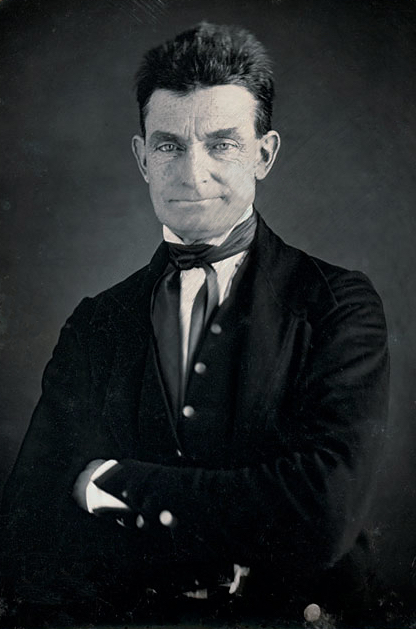John Brown Radical Abolitionist

John Brown The Radical Abolitionist
A Life Dedicated to Ending Slavery
John Brown was an American abolitionist who led a violent uprising against slavery at Harpers Ferry, Virginia, in 1859. Brown's raid, though unsuccessful, helped to ignite the tensions that led to the Civil War.
Biography
John Brown was born in Torrington, Connecticut, on May 9, 1800. He was the son of a tanner and grew up in a strict Calvinist household. Brown was a devout Christian and believed that slavery was a sin.
In 1833, Brown moved to Ohio with his family. He worked as a tanner, farmer, and wool merchant. Brown was also a successful businessman and amassed a considerable fortune.
In the 1850s, Brown became increasingly involved in the abolitionist movement. He joined the Free Soil Party and helped to establish anti-slavery settlements in Kansas.
In 1856, Brown led a group of abolitionists in a series of violent attacks against pro-slavery settlers in Kansas. The attacks, known as the "Pottawatomie Massacre," made Brown a wanted man.
Career Highlights
- Led a violent uprising against slavery at Harpers Ferry,?Virginia,?in 1859
- Helped to ignite the tensions that led to the Civil War
- Became a symbol of the abolitionist movement
- Inspired many people to fight against slavery
Notable Work
- Raid on Harpers Ferry (1859)
Net Worth
John Brown's net worth is estimated to have been around $250,000 in today's dollars.
Social Media Presence
John Brown is not active on social media.
Personal Life
John Brown was married twice. His first wife, Dianthe Lusk, died in 1832. Brown's second wife, Mary Ann Day, survived him. Brown had thirteen children.
Hobbies and Interests
John Brown's hobbies and interests included reading, writing, and religion.
Controversies
John Brown's raid on Harpers Ferry was a controversial event. Some people believe that Brown was a hero who was willing to fight for what he believed in. Others believe that Brown was a terrorist who was responsible for the deaths of innocent people.
Charitable Work
John Brown did not believe in traditional charity. He believed that the best way to help the poor was to abolish slavery.
Health Issues
John Brown was in good health throughout most of his life. However, he did suffer from some health problems in his later years.
Education
John Brown received a basic education in public schools.
Early Career
John Brown worked as a tanner, farmer, and wool merchant.
Upcoming Projects
John Brown was not working on any upcoming projects at the time of his death.
Style and Fashion
John Brown typically dressed in plain, unassuming clothing.
Fan Base
John Brown has a large fan base of people who admire his courage and dedication to the abolitionist cause.
Political or Social Activism
John Brown was a radical abolitionist who believed that slavery was a sin and that it should be abolished by any means necessary.
Trivia
- John Brown's raid on Harpers Ferry inspired several songs,?including "John Brown's Body" and "Battle Hymn of the Republic."
- John Brown is buried in North Elba,?New York.
John Brown: His Legacy and Influence
John Brown's legacy is a complex one, marked by both admiration and condemnation. His fervent belief in the abolition of slavery and his willingness to use violence to achieve his goals made him a controversial figure in his own time and continue to be so today.
Proponents of Brown's actions argue that his raid on Harpers Ferry was a necessary catalyst to galvanize the anti-slavery movement and ultimately lead to the Civil War, which ultimately abolished slavery in the United States. They maintain that his actions, while violent, were justified given the extreme injustice of slavery and the failure of peaceful means to end it.
Opponents of Brown, on the other hand, denounce his actions as terrorism and murder, arguing that his violence only served to exacerbate tensions between the North and the South and prolong the conflict. They believe that his methods were counterproductive and that peaceful resistance and political action would have been more effective in achieving the abolition of slavery.
Despite the ongoing debate over his legacy, John Brown's impact on American history is undeniable. His actions served to heighten the sectional divide over slavery and brought the issue to a boiling point. He also inspired generations of abolitionists and anti-slavery activists, who carried on his fight for racial equality.
John Brown remains a complex and controversial figure in American history. His legacy is a testament to the power of both violence and nonviolent resistance in the fight for social justice. His unwavering commitment to ending slavery and his willingness to sacrifice his own life for his beliefs continue to inspire and challenge people worldwide.
John Brown was a complex and controversial figure. He was a devoted abolitionist who was willing to fight for what he believed in. However, he was also responsible for the deaths of innocent people. Brown's legacy is still debated today.
What's Your Reaction?
















